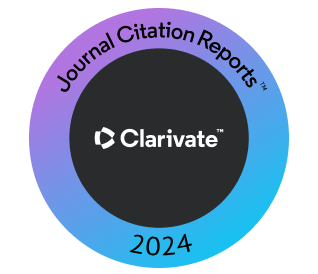Atherogenic Index of Plasma in the Three Trimesters of Pregnancy
DOI:
https://doi.org/10.14500/aro.11337Keywords:
Atherogenicity, Lipoproteins, Plasma, Pregnancy, TrimesterAbstract
This study investigates the change that occurs for atherogenic index of plasma (AIP) which is a very good marker for the evaluation of the risk of atherogenicity and cardiometabolic health. This study indicates the logarithm of the triglyceride and high-density lipoprotein cholesterol (log [TG/HDL-c]). The parameters of triglycerides (TG) and high-density lipoprotein cholesterol (HDL-c) are estimated and compared with the control cases. The AIP is calculated for each case during pregnancy in first, second, and third trimesters separately and each is compared with control cases. The study population comprised (80) women aged between (20–40) years distributed to (20) healthy non-pregnant women, (20) in the first trimester, (20) in the second trimester, and (20) in the third trimester in Koya health centers. The results of this study showed a significant increase in the TG level in both the second and third trimesters of pregnancy compared to the control cases. Whereas, in the first trimester of pregnancy, it can be assumed that there is a non-significant decrease of TG level rather than control cases. As well as the serum levels of HDL for all three trimesters of pregnancy displayed non-significant changes when compared to non-pregnant cases. These data illustrate that the AIP levels during both the second and third trimesters of pregnancy are significantly higher, as compared to control cases, whereas the AIP levels in the first trimester are non-significantly elevated, as compared with control casesDownloads
References
Adam, S., Pheiffer, C., Dias, S., Hlongwane, T., Vannevel, V., Soma-Pillay, P., and Abdullah, F. 2022. Coronavirus and pregnancy: The challenges of the 21st century: A review. Frontiers in Microbiology, 13, p.923546. DOI: https://doi.org/10.3389/fmicb.2022.923546
Bailey, A., and Mohiuddin, S.S. 2022. Biochemistry, High Density Lipoprotein. StatPearls Publishing, Treasure Island, FL.
Bartels, Ä., and O’Donoghue, K. 2011. Cholesterol in pregnancy: A review of knowns and unknowns. Obstetric Medicine, 4, pp.147-151. DOI: https://doi.org/10.1258/om.2011.110003
Bartha, I., Joumady, I., Cuerva, M., and Bartha, J.L. 2023. The effect of maternal obesity and lipid profile on first-trimester serum progesterone levels. American Journal of Obstetrics and Gynecology MFM, 5, p.100959. DOI: https://doi.org/10.1016/j.ajogmf.2023.100959
Brown, W.V. 2007. High-density lipoprotein and transport of cholesterol and triglyceride in blood. Journal of Clinical Lipidology, 1, pp.7-19. DOI: https://doi.org/10.1016/j.jacl.2007.02.001
Butt, K., and Lim, K.I. 2019. Guideline no. 388-determination of gestational age by ultrasound. Journal of Obstetrics and Gynaecology Canada, 41, pp.1497-1507. DOI: https://doi.org/10.1016/j.jogc.2019.04.010
Castañer, O., Pintó, X., Subirana, I., Amor, A.J., Ros, E., Hernáez, Á., Martínez-González, M.Á., Corella, D., Salas-Salvadó, J., and Estruch, R. 2020. Remnant cholesterol, not LDL cholesterol, is associated with incident cardiovascular disease. Journal of the American College of Cardiology, 76, pp.2712-2724. DOI: https://doi.org/10.1016/j.jacc.2020.10.008
Chen, M., Fang, C.Y., Guo, J.C., Pang, L.M., Zhou, Y., Hong, Y., Yang, L.F., Zhang, J., Zhang, T., and Zhou, B.F. 2023. Predictive value of atherogenic index of plasma and atherogenic index of plasma combined with low-density lipoprotein cholesterol for the risk of acute myocardial infarction. Frontiers in Cardiovascular Medicine, 10, p.1117362. DOI: https://doi.org/10.3389/fcvm.2023.1117362
Chen, Z., Hu, H., Chen, M., Luo, X., Yao, W., Liang, Q., Yang, F., and Wang, X. 2020. Association of Triglyceride to high-density lipoprotein cholesterol ratio and incident of diabetes mellitus: A secondary retrospective analysis based on a Chinese cohort study. Lipids in Health and Disease, 19, p.33. DOI: https://doi.org/10.1186/s12944-020-01213-x
Chikhaoui, M., Smail, F., Aiche, S., and Benamor, N. 2023. Comparing hematological and biochemical profiles of pregnant and non-pregnant barb mares raised in Tiaret, Algeria. Iranian Journal of Veterinary Medicine, 17, pp.309-320. DOI: https://doi.org/10.32598/IJVM.17.4.1005365
Galal, H., Samir, A., and Shehata, M. 2020. Assessment of apolipoprotein B/apolipoprotein AI ratio in non-ST segment elevation acute coronary syndrome patients. The Egyptian Heart Journal, 72, pp.1-8. DOI: https://doi.org/10.1186/s43044-020-00057-1
Hadi, N.A., Mahmoodb, R.T., and Hadi, H.A. 2021. Estimation of calcium, iron, zinc and some antioxidants in the serum of pregnant women in samarra. Annals of the Romanian Society for Cell Biology, 25, pp.10536-10542.
Hao, Q.Y., Gao, J.W., Yuan, Z.M., Gao, M., Wang, J.F., Schiele, F., Zhang, S.L., and Liu, P.M. 2022. Remnant cholesterol and the risk of coronary artery calcium progression: Insights from the CARDIA and MESA study. Circulation: Cardiovascular Imaging, 15, p.e014116. DOI: https://doi.org/10.1161/CIRCIMAGING.122.014116
Ireshanavar, D.S., Shetty, S., Rao, A., Patil, V.S., Patil, V.P., and Shilpasree, A.S. 2019. Establishment of reference intervals for fasting and nonfasting serum lipid profile from healthy population in Mangaluru, Karnataka, India. Indian Journal of Medical Biochemistry, 23, pp.327-330. DOI: https://doi.org/10.5005/jp-journals-10054-0124
Jadhav, H.B., and Annapure, U.S. 2023. Triglycerides of medium-chain fatty acids: A concise review. Journal of Food Science and Technology, 60, pp.2143-2152. DOI: https://doi.org/10.1007/s13197-022-05499-w
Jomard, A., and Osto, E. 2020. High density lipoproteins: Metabolism, function, and therapeutic potential. Frontiers in Cardiovascular Medicine, 7, p.39. DOI: https://doi.org/10.3389/fcvm.2020.00039
Karizi, S.R., Armanmehr, F., Azadi, H.G., Zahroodi, H.S., Ghalibaf, A.M., Bazzaz, B.S.F., Abbaspour, M., Boskabadi, J., Eslami, S., and Taherzadeh, Z. 2023. A randomized, double‐blind placebo‐controlled add‐on trial to assess the efficacy, safety, and anti‐atherogenic effect of Spirulina platensis in patients with inadequately controlled type 2 diabetes mellitus. Phytotherapy Research, 37, pp.1435-1448. DOI: https://doi.org/10.1002/ptr.7674
Kim, S.H., Cho, Y.K., Kim, Y.J., Jung, C.H., Lee, W.J., Park, J.Y., Huh, J.H., Kang, J.G., Lee, S.J., and Ihm, S.H. 2022. Association of the atherogenic index of plasma with cardiovascular risk beyond the traditional risk factors: Anationwide population-based cohort study. Cardiovascular Diabetology, 21, p.81. DOI: https://doi.org/10.1186/s12933-022-01522-8
Liu, C., Yin, J., Lu, B., and Lin, W. 2022. Exploring of blood viscosity in injured liver tissues of hyperlipidemic mice. Dyes and Pigments, 202, p.110272. DOI: https://doi.org/10.1016/j.dyepig.2022.110272
Marou, A. 2021. Non-high-density-lipoprotein cholesterol in Morocco hemodialysis patients. Scholars International Journal of Biochemistry, 4, pp.52-56.
Mora, S., Chang, C.L., Moorthy, M.V., and Sever, P.S. 2019. Association of nonfasting vs fasting lipid levels with risk of major coronary events in the Anglo-Scandinavian cardiac outcomes trial-lipid lowering arm. JAMA Internal Medicine, 179, pp.898-905. DOI: https://doi.org/10.1001/jamainternmed.2019.0392
Muhammad, H., Aghatise, E.K., and Bello, F.S. 2023. Evaluation of some hemostatic Changes in pregnant women attending FMC keffi, Nasarawa state, Nigeria. Asian Hematology Research Journal, 6, pp.243-248.
Muralidhara, M. 2023. Exploring the neuro-ameliorative propensity of Withania somnifera-Indian ginseng. In: Ayurvedic Herbal Preparations in Neurological Disorders. Elsevier, Amsterdam. DOI: https://doi.org/10.1016/B978-0-443-19084-1.00012-0
Musa, M.I.S. 2023. Effect of pregnancy stages on changes in lipid profiles. Journal for Research in Applied Sciences and Biotechnology, 2, pp.26-30. DOI: https://doi.org/10.55544/jrasb.2.1.6
Nakamura, K., Kageyama, S., Tanaka, H., Kawasaki, K., and Terashima, K. 2011. Development of Fuji Dri-chem v-LIP-P slide that has the high specificity to pancreatic lipase. Fujifilm Research and Development, 56, pp.5-10.
Nordestgaard, B.G., and Varbo, A. 2021. Triglyceride-rich lipoprotein cholesterol (remnant cholesterol) as a therapeutic target for cardiovascular disease risk. In: Therapeutic Lipidology. Humana, Cham, pp.139-158. DOI: https://doi.org/10.1007/978-3-030-56514-5_8
Paleari, R., Vidali, M., Ceriotti, F., Pintaudi, B., De Angelis, M.L., Vitacolonna, E., Cataldo, I., Torlone, E., Succurro, E., and Angotti, E. 2023.
Reference intervals for glycated albumin during physiological pregnancy of Europid women: Evidences from a prospective observational study. Clinica Chimica Acta, 541, p.117246. DOI: https://doi.org/10.1016/j.cca.2023.117246
Pownall, H.J., Rosales, C., Gillard, B.K., and Gotto, A.M. Jr. 2021. High-density lipoproteins, reverse cholesterol transport and atherogenesis. Nature Reviews Cardiology, 18, pp.712-723. DOI: https://doi.org/10.1038/s41569-021-00538-z
Rajab, T. 2012. Comparative study for atherogenic index of plasma (AIP) in patient with type 1 diabetes mellitus, type 2 diabetes mellitus, beta thalassemia and hypothyroidism. International Journal of Chemical Research, 2, pp.1-9.
Shah, A., Patel, J., Isath, A., Virk, H.U.H., Jneid, H., Zelop, C.M., Mehta-Lee, S., Economy, K.E., Gulati, M., and Krittanawong, C. 2023. Cardiovascular complications in pregnancy. Current Treatment Options in Cardiovascular Medicine, 25, pp.1-24. DOI: https://doi.org/10.1007/s11936-023-01000-8
Sobik, S., Sims, C.R., Crimmins, M., Bimali, M., Williams, D.K., and Andres, A. 2023. Associations between maternal physical activity, maternal lipid levels,
and infant anthropometric outcomes at two weeks of age. Maternal and Child Health Journal, 27, pp.168-177.
Vinh, P.Q. 2021. Changes in hematology parameters in the first trimester pregnant women. Scientific Journal Current Research, 45, pp.44-47.
Wang, T.Y., Liu, M., Portincasa, P., and Wang, D.Q.H. 2013. New insights into the molecular mechanism of intestinal fatty acid absorption. European Journal of Clinical Investigation, 43, pp.1203-1223. DOI: https://doi.org/10.1111/eci.12161
Wild, R., and Feingold, K.R. 2023. Effect of pregnancy on lipid metabolism and lipoprotein levels. In: Endotext. MDText.com, Inc., South Dartmouth.
Yildiz, M., Miedema, M.D., Murthy, A., Henry, T.D., Bergstedt, S., Okeson, B.K., Schmidt, C.W., Volpenhein, L., Garcia, S., and Sharkey, S.W. 2023. Association of triglyceride levels with adverse cardiovascular events in patients with ST-segment elevation myocardial infarction. Heliyon, 14, p.e17308. DOI: https://doi.org/10.1016/j.heliyon.2023.e17308
Zhang, P., Zhang, Z., Li, D., Han, R., Li, H., Ma, J., Xu, P., Qi, Z., Liu, L., and Zhang, A. 2023. Association of remnant cholesterol with intracranial atherosclerosis in community-based population: The ARIC study. Journal of Stroke and Cerebrovascular Diseases, 32, p.107293. DOI: https://doi.org/10.1016/j.jstrokecerebrovasdis.2023.107293
Zhu, Y., Zhu, H., Dang, Q., Yang, Q., Huang, D., Zhang, Y., Cai, X., and Yu, H. 2021. Changes in serum TG levels during pregnancy and their association with postpartum hypertriglyceridemia: Apopulation-based prospective cohort study. Lipids in Health and Disease, 20, p.119. DOI: https://doi.org/10.1186/s12944-021-01549-y
Downloads
Published
How to Cite
Issue
Section
License
Authors who choose to publish their work with Aro agree to the following terms:
-
Authors retain the copyright to their work and grant the journal the right of first publication. The work is simultaneously licensed under a Creative Commons Attribution License [CC BY-NC-SA 4.0]. This license allows others to share the work with an acknowledgement of the work's authorship and initial publication in this journal.
-
Authors have the freedom to enter into separate agreements for the non-exclusive distribution of the journal's published version of the work. This includes options such as posting it to an institutional repository or publishing it in a book, as long as proper acknowledgement is given to its initial publication in this journal.
-
Authors are encouraged to share and post their work online, including in institutional repositories or on their personal websites, both prior to and during the submission process. This practice can lead to productive exchanges and increase the visibility and citation of the published work.
By agreeing to these terms, authors acknowledge the importance of open access and the benefits it brings to the scholarly community.
Accepted 2023-11-10
Published 2023-11-21
















 ARO Journal is a scientific, peer-reviewed, periodical, and diamond OAJ that has no APC or ASC.
ARO Journal is a scientific, peer-reviewed, periodical, and diamond OAJ that has no APC or ASC.